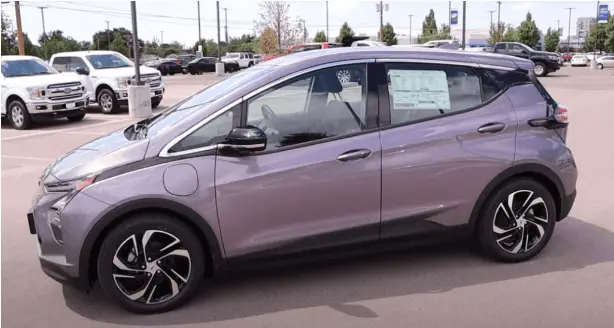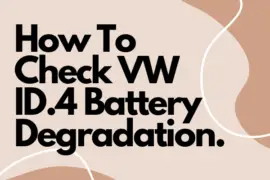Last Updated on May 30, 2023 by Rose Morah
In case you are wondering how long it takes to charge a Chevy Bolt, this article has detailed coverage of:
- Chevy Bolt charging speed.
- Chevy Bolt charging time.
- Chevy Bolt DC fast charging rate.
- Chevy Bolt max charge rate.
Without further ado, let’s jump right in.
Chevy Bolt charging speed
What’s Bolt’s charging speed?
All 2017 to 2021 Bolts can charge up to a maximum speed of 55kW, at a DC fast charger. However, this is relatively lower compared to the likes of other non-Tesla EVs, such as ID.4.
See Volkswagen ID.4 Charging Guide (ID.4 Charging Speed and Tips).
Bolt was designed to charge to a maximum speed of 50 to 55kW probably because during the time it was being introduced to the market the faster chargers were primarily at 50kW.
But one would likely wonder, why has there not been any improvement in the charging speed?
Well, GM has previously stated that its goal is to achieve long-term battery health.
Can you take a Bolt on a road trip?
Frankly, with Bolt’s charging speed, your road trip will definitely be a very slow one considering how long it will take you to charge to 80% or even 100%.
Having said that, you might then be wondering how long it will really take you to charge a Bolt?
How long does it take to charge a Bolt?
We tested two 2020 Bolts to find out how long it would really take to fully charge.
The first Bolt had no charge. So, it was charged from 0 – 100%.
The second Bolt was 55% full. Thus, was charged from 55% to 100%
The table below shows the charging speed and time results from these two Bolts (at a fast DC charger).
| Bolt | Charging time from 0 – 50% (Charging speed – 50kW to 55kW) | Charging time from 50% – 100%( Charging speed drops to 30 to 33kW) | Total Charging Time from 0 – 100% |
| 1ST Car | 38 minutes | 70 minutes | 1 hour 48 minutes |
| Bolt | Charging Time from 55% to 100% | ||
| 2nd Car | 60 minutes |
From the above table, the following information about Bolt’s charging speed is worth noting:
- When charging the Bolt from 0 to 100% at a speed of about 50kW, you can get 90 miles in 30 minutes. However, once you surpass the 90 miles range, the charging speed starts to drop and become slower. This is mostly from 50% to 55% charge.
- The cost of charging the Bolt at Electrify America DC fast charger was $13.
- The first 1st car would reach its peak at 53kW at the fast charger.
| Pre 2020 Bolt can go up to 238 miles in optimal conditions while post-2020 Bolts can go up to 259 miles in optimal conditions What are Optimal Conditions? Driving with no heat, not running the AC. Normal driving speed. |
What is Bolt’s charging speed on level 1 chargers?
We decided to charge the Bolt overnight at home from a level 1 charger at 12 amps, starting at 50% charge.
The Bolt was fully charged the following day.
We started off at 50% because most drivers don’t normally arrive with a battery charge that is below 20% (it is very unlikely).
Additionally, EV charging is mostly recommended to about 80% charge. This means that you will not be charging from 0 – 100%.
Therefore, if you only drive your Bolt for only a few miles daily, the level 1 charger will be convenient.
So, based on these conclusions, I would strongly like to state that Bolt is definitely not a great EV for long road trips.
However, it is still a great car for people who only drive for short distances around the city/town environment.
Most drivers who use Bolt for short commutes only charge once or twice a week overnight and drive throughout the week without worrying about the battery dying.
Additionally, Bolt is a great choice for those who intend to keep it for many years because that is actually GM’s main goal.
See also:
Types of EV Charging and EV Plugs.
What to know before Running an EV Charging Cable Across The Pavement.
What if you want to take the Bolt on a long road trip?
I wouldn’t recommend taking Bolt on a long road trip, but if you really got no other choice, then there are a few things that you will need to consider before you leave.
N/B: this information is based on our experience with Bolt on a long road trip.
Here are some of the key things to note:
- Make sure there’s a level 2 charger where you will be spending the night. This is because the car will need to charge up to 100% to cover the following day.
- Prepare for longer stops along the way. As mentioned earlier, it would take longer to charge from 50% and above.
- When charging twice a day to full charge (100%) you will likely expect to cover around 600 miles in a day.
- If you’re planning to cover less than 500 miles a day on your road trip, I would recommend that you space out your charging stops (about 80 to 120 miles) along your route.
This would mean arriving at the charging stop with about 10% charge and charging to 60%. Remember, also, to take note of the weather and the terrain as it also affects your range.
This way you will have a fast road trip because you will not have to sit for long waiting for your Bolt to charge.
- Don’t rely on the MyChevy app. Instead, use a good road trip planner app such as PlugShare that shows you important info such as the elevation changes, which affect your range.
See also: How To Check Nissan Leaf Battery Health (Battery Degradation Status).
Bolt’s charging speed vs. non-Tesla EVs
What’s Bolt’s charging speed compared to other non-Tesla EVs?
Before we dive into the comparison, I would like to point out that, most of the EVs in the market today charge faster at the lower half of the pack (from 0% – 50%).
The following is a table comparison of some of the Evs’ charging times based on our experiences.
We took these EVs at DC fast chargers and after plugging them at the same time, the following were the results:
| Type of EV | Charging from 10 – 80% |
| Bolt | 65 minutes |
| Mach-E | 45 minutes |
| Polestar 2 | 40 minutes |
| Volkswagen ID.4 | 36 minutes, |
In conclusion, even though Bolt has a very slow charging speed, it still makes a great car depending on your personal needs.
Additionally, the 2022 Bolt has made it easy for people who like space or like to travel with family because of its now unique design.




